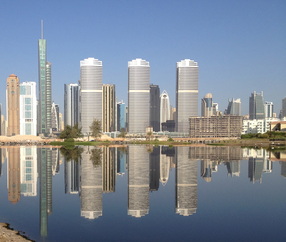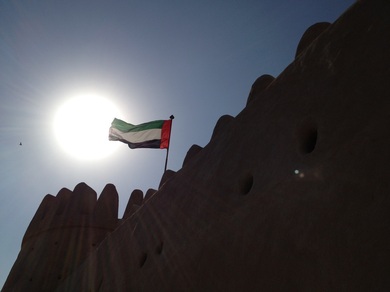Dubai: Finding a roof over your head
Where do you start when you arrive in a new place, where you don't know anyone and don't know north from south?
Although expensive, a relocation agent is a great first point of contact as they can independently give you advice. They know the geography, how things tick and have a good handle on how to settle into your new life. They understand the short cuts and the processes for everything from finding a house to finding a school. Estate agents often represent the landlord, and will expect a commission on any house they sell or rent to you. The commission is paid for by the tenant. The third place to search is the classified section in local newspapers, such as Gulf News, and on-line, for example www.dubizzle.com or www.propertyfinder.ae. Renting Most expats choose to rent as the property market can go up and down regularly. Rent is paid in advance and contracts are usually for a year. If a landlord will accept multiple cheques this will be to a maximum of four, and they will be post-dated so make sure you have the right funds in your bank account. The fewer cheques you’re able to offer, however, the better your bargaining power, and very often employers provide a housing allowance in advance. The law protects tenants from spiralling rental increases and the landlord has to inform tenants of increases in writing 90 days before the end of the contract. The Real Estate Regulatory Agency (RERA) website offers a rental increase calculator, which will give you an insight into typical rental increases in your area. (www.rpdubai.ae). Buying Buying a property can be a complicated process and your location will be restricted. Since 2002, expats are legally able to buy homes but only in certain designated areas. Location If you have children of school age, you can immediately narrow your search based on the schools you’d like them to attend. Otherwise your work place might be the best focus point. Popular places to live, if you would like an apartment, are Dubai Marina, Palm Jumeirah and Downtown Dubai. If you’re interested in a villa you might like to consider Palm Jumeirah, Jumeirah Islands, The Meadows, The Springs, Victory Heights and Arabian Ranches, although this is not an exhaustive list. Explorer publish the Dubai: Live, Work, Explore guide, which gives more in-depth advice. Moving, packing and what you’ll need Many companies offer sea and/or air shipping for employees moving to Dubai, although if you need to arrange this yourself there are plenty of removal and shipping companies. Air freight is faster and more expensive. Sea freight can take between six and ten weeks depending on where it is coming from and whether it has been held up at customs. Be aware of everything you pack and make sure there are no illegal items to hold the process up, for example alcohol, certain reading material and DVDs, culinary poppy seeds or poppies in flower displays. Make sure you have a full inventory of what has been packed in each box, and that your insurance policy has the right cover. Once you have secured a home you will often need to buy white goods and curtains. These are often included in apartments but rarely in villas. This includes the washing machine, dishwasher, refrigerator and oven. There is a lively second hand market (see www.dubizzle.com or www.expatwoman.com) but if you want to buy new goods places like Geant, Carrefour and Sharaf DG are the best places to start. Try IKEA or a local curtain maker for the best prices for curtains. Checklist and budget Maintenance – Make sure you understand who is responsible when things go wrong. Does the landlord include a maintenance package in the rent? Many expats have been caught out with spiraling costs. Landlords often hand the house over to a tenant expecting you to pay when the a/c breaks down or the water heater springs a leak. Utilities – Understand how much your bills are likely to be. These are paid to the Dubai Electricity and Water Authority (DEWA), although air conditioning cooling is sometimes paid to a separate company depending on where you live. You may need to consider electricity, air conditioning, water, sewerage, gardening, housekeeping/ cleaning, pool maintenance, depending on whether you’re in an apartment or a villa. On top of your actual consumption bill you will also need to pay a refundable utility deposit directly to DEWA. The electricity in Dubai is 220/240 volts and 50 cycles. The three pin plugs are the same as the UK system, although if you buy electrical goods in the UAE it is not uncommon for them to be supplied with a two-pin plug. You will then need to buy a plug adaptor, which can be bought for a couple of Dirhams from most supermarkets. Additional expenses – The security deposit to the landlord, usually between Dhs 5,000-10,000, should be included in your budget, as well as the estate agent’s fee, which is around 5% of the value of the annual rent. You will also be required to pay a Municipality Housing Tax, or Housing fee, through your utilities bill. This is based on the value of your rent and is around 5%. Lease – the official lease should be registered by your estate agent with the rent committee, RERA, at the time of signing. You will also need to reregister your lease when you renew your contract in order for your Municipality Housing Tax to be calculated. For the lease to be registered, the landowner must have an official title deed for the property, but not all properties have title deeds. |
To stay posted either join our Explorers' Club to receive email notifications or follow us on Facebook. Good luck with your new adventure! We'd love to hear how you are getting on. Need a break?There is nothing like a bit of exploring to help you feel settled. If you've just moved to the UAE and Oman you might like to give these trips a go. Just click here:
Trips around the UAE and Oman |


